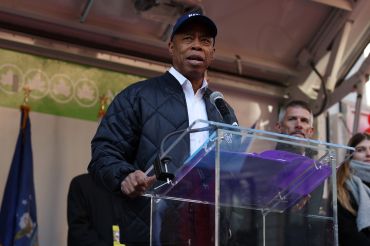The Moviegoer: Cohen Brothers Realty’s Charles Cohen Talks Real Estate, Predicts Oscar Winners
By Billy Gray February 19, 2013 11:00 am
reprintsCharles Cohen is in the business of creating. As the president and chief executive officer of Cohen Brothers Realty Corporation, Mr. Cohen oversees a portfolio of properties and design centers in New York, Florida, Texas and California. He also executive produced the Academy Award-winning Frozen River and runs Cohen Media Group, a distributor and producer of foreign and independent films. Mr. Cohen’s father, Sherman Cohen, the developer who built CBRC into a powerhouse with his two brothers, died late last month at 91. And while Mr. Cohen politely declined to answer direct questions about his father, he did speak to The Commercial Observer about his legacy when discussing recent developments at the firm and in New York real estate. Mr. Cohen also spoke enthusiastically about the film industry and this year’s crop of new movies, which will be in the national spotlight when the Academy Awards airs this Sunday.
The Commercial Observer: In 2011, you told The Commercial Observer that you and the rest of the real estate industry were moving at 25 miles per hour. What was the speed in 2012?
Mr. Cohen: In New York, we’re going twice as fast as last year, but not fast enough.
I think in New York, there’s still some serious reassessment going on regarding space utilization. It’s now typical for planning to include two people in an office. The footprint per person is smaller than it was before. Then you have this other movement in New York, which is to try to justify demand for more contemporary space and premium rents, which to me defies what’s going on. It doesn’t make any sense. The $100-per-foot deals are so few and far between. And the cost to create new space today is extravagantly expensive.
Finally, you have upzoning, which I think is a fantasy.
Are you referring to the proposed Midtown East rezoning?
Yes. I think it’s so far-fetched. Who can afford the space and the costs to develop it? It makes everything even more expensive. I don’t think there’s demand for that kind of land.
One of the goals of the proposal is to attract technology companies seeking modern, open spaces.
Where? They can be in the suburbs or their own homes. Look again at space utilization. How many businesses can afford to pay $100-per-square-foot rent? That’s the problem, no matter how good or bad times are. We’ve gone through such a sobering series of changes. When you make cuts, you learn to live with less for a long time. You don’t immediately go back to being profligate.
The problem in New York City is the cost of doing business here. And one of the largest components is real estate taxes. They’re not addressing the fundamental cost. Mayor Bloomberg is a great mayor and a great thinker. But he doesn’t understand that the landlord and developer are middlemen between all the costs—financing, real estate taxes, operating expenses—and the tenant. The tenant picks up the cost. We have real estate taxes per square foot here that are higher than rents in most places in the country.
What solution do you have in mind?
The city’s methodology is out of touch with reality. Tenants and owners want certainty about what their taxes will be. Why not come up with a cap of 20 percent of your rent being how much you can pay in taxes? The city has a big department of tax assessors who come up with all these arcane, archaic formulas.
What might be the impetus to alleviate the tax burden? Could there be an exodus from Midtown to less expensive neighborhoods like, say, Downtown Brooklyn?
No, no. I think what you see is a fracture of traditional groupings of business types. You have small pockets of high-priced space now being developed near the High Line, where people will pay up to $100 per square foot because it’s a trendy neighborhood.
We saw that 10 or 15 years ago in Soho, but we didn’t have new construction. We had retrofitted loft buildings. Before that, we had the same thing in Midtown South. What saved Downtown, other than new construction, was readapting antiquated office buildings or turning them residential. People used to say, “Park Avenue is for this kind of tenant and the World Financial Center is for that kind of tenant.” Those boundaries have been erased by how we do business.
In the last year or two, several significant tenants moved out of your buildings at 622 Third Avenue, 3 Park Avenue and 135 East 57th Street. How are those properties doing?
Cushman & Wakefield is taking on three large agencies for us at those buildings.
A Cushman & Wakefield team led by Chairman of Global Brokerage Bruce Mosler in 2010 helped turn things around at 805 Third Avenue after large departures there. Do these reshufflings give you anxiety, or are they par for the course at this point?
It’s part of the landscape. I mean, the options are going floor by floor or three or four floors at once. The choice depends on economics and the time frame. What’s challenging for a landlord is the tenant who would occupy the big blocks looks way in advance. The likelihood of the landlord collecting rent in the near future is remote. With smaller tenants, you spread the risk, and you’ve also not put all your eggs in one basket.
Let’s talk about 475 Park Avenue South. Do you think there’s a tipping point in Midtown South when it comes to the technology presence there? Is that growth sustainable?
We’re strong in Midtown South. My father and his brothers built the only two new buildings south of Grand Central: 475 Park Avenue South and 3 Park Avenue. We’ll complete a major renovation at 475 Park Avenue South within the next 14 months.
The street came into its own as an alternative to Park Avenue and then Madison Avenue. A lot of the older properties were converted carpet buildings. Then it became a logical place for Madison Avenue ad agencies, which are still strong there. Now you have a little bit of everything.
Is tech new to that area? No. Will it be the last industry to move into that area? No.
You’re a lover of design. What do you think of the blockbuster architecture projects—8 Spruce Street, the Barclays Center, several West Chelsea properties near the High Line—over the past few years?
Well, they’re small footprints. There’s only so much you can accomplish.
You haven’t been bowled over by recent architecture?
No. I’m more bowled over by the architecture out West.
On another creative note, what’s the latest news with Cohen Media Group?
We’re one of the largest distributors of French cinema in the United States. We’ve released seven or eight films already, and have 20 coming up in the next two years. We’re producing as well.
It’s not dissimilar from real estate development. It’s creative, and at the same time we’re creating income streams. Also, I’m at an interesting place in the development of the film industry, because it’s not just theatrical exhibition, but people watching on computers, DVDs, streaming. There are so many different ways to peel the onion.
Frozen River came out in 2008. Then independent cinema—especially indie distribution—took a big hit during the recession. Has it been a struggle?
That’s why I jumped in. I’d worked with a third-party distributor on Frozen River. My experience was … educational. I’m choosing my words carefully. And I thought, why not take advantage of an opening and build a new model of film distribution for independent cinema? Do it in a way that’s more cost effective and explores the marketing in nontraditional ways.
There seems to be a pendulum with American movies, from the gritty New Hollywood ’70s to the blockbuster ’80s and then the indie-Sundance ’90s. Where is it now?
Well, I think it’s great for the entrepreneurial American spirit. These days—even in real estate—there are not that many private owners. There’s been a consolidation on the ownership side. What we do is not that different from what the independent filmmakers do—they’re pioneers.
Will you attend the Oscars?
No, I’ll be back in New York.
What’s your pick for Best Picture?
What’s yours?
I’d like to see Django Unchained or Amour win it, but they won’t.
I didn’t think it was a great year for movies. But I think Argo will probably win, because it’s a really good TV movie. That’s what people relate to right now. It’s well done for what it is.



